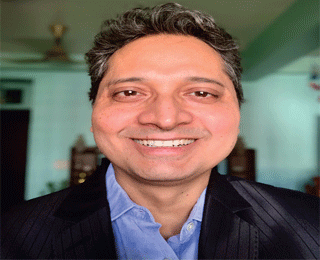India Cannot Afford To Ignore Cryptocurrency!

Prof. SatyakamChakravarty, Visiting Faculty, Blockchain IIM Udaipur
Cryptocurrency is a digital token used in a blockchain network to exchange messages and values without requiring the help of an intermediary. The underlying Blockchain technology has immense potential to impact human lives and businesses equally. The crypto token is the currency used in the network to perform various functions namely – transactions, payment towards making changes to the blockchain database, used as incentives to keep the blockchain running, database safe and the network secure.
The market forces assign a value to a crypto-token based on various factors including the usage potential of its respective project in real life.
Ethereum, one such promising project, is like a universal world computer, that can be accessed by anyone from anywhere. One can create a decentralised application or DApp, using a smart contract and run it on the Ethereumblockchain platform paying a small transaction fee in its native token ether. A smart contract is like a promise to deliver without requiring middlemen with no counterparty risks involved. DApps with smart contracts are being developed to solve real business problems across industries.
In the financial world, smart contract-based applications have given birth to decentralised finance or DeFi. It is like a banking system without a traditional centralised structure. People use DeFi to lend and borrow cryptocurrencies and like any other system, the lenders earn interest on their capital and the borrowers pay. Currently more than $60 billion worth of cryptocurrencies are locked on various DeFi platforms. Aave is the leader among them with more than $12 billion value locked on it.
Today, many DApps are built and deployed across industries like gaming, real estate, media, insurance, supply chain etc. These DApps also have their own native tokens created by Ethereum protocol ERC 20 and are used for performing various functions in their respective networks. All these tokens are traded on cryptocurrency exchanges across the globe. In India, there are more than 15 cryptocurrency exchanges where people are spending millions on trade every day.
The cryptocurrency market has given birth to a new asset class that is digital, decentralised, censorship resistant and borderless. Today the size of the global cryptocurrency market is more than $1.5 trillion, that reached its all-time high of $2.5 trillion, a few weeks back.
All these started with the birth of bitcoin in January 2009. While, then there was only one crypto token, today there are thousands of crypto tokens with their respective teams working towards building some useful application to win the attention of the people to increase token’s usage and value.
Globally, there are more than 100 million people using cryptocurrency with new users getting added every day. Recently PayPal launched cryptocurrencies on its payment platform where more than 300 million subscribers will be able to buy, sell and use cryptocurrencies. Many leading global brands like KFC, Pizza Hut, YUM, Microsoft, Tradingview accept cryptocurrencies as payment towards their goods and services in certain jurisdictions.
Many countries have developed framework to regulate cryptocurrencies. Japan was the first country to enact a law to define the term “Crypto Assets” and accepted them of having proprietary value that can be used to pay for any goods and services. Recently El Salvador passed an act to recognise Bitcoin as a legal tender, requiring businesses to accept it as currency in exchange for goods and services. The President Mr.NayibBukele believes that it will help to solve the issue of low banking penetration and will also make remittances to the country more cost effective.
“Globally, there are more than 100 million people using cryptocurrency with new users getting added every day”
Crypto assets have been the best performing asset class in the past decade. Bitcoin, with annualized return of more than 200%, has outperformed all other assets in the market. NASDAQ 100 is second to it, with an annualized return of 20%. Younger generation in the age group of 25 to 40 are investing in this new emerging asset class. In India, more than 10 million people are invested in cryptocurrencies spread across 15+ cryptocurrency exchanges in India.
Among all the cryptocurrencies, Bitcoin being the real scarce currency, is considered as digital gold and many investors are holding this for the long-term gains. More than 20 corporates in the US have made bitcoin part of their treasury to hedge local fiat currency risks. The prominent ones among them are Tesla, MicroStrategy, Square and Coinbase Global.
For a nation state, blockchain and cryptocurrency can transform delivery of all the citizen centric government schemes. Social schemes can be run using a smart contract and benefits can be directly distributed using a cryptocurrency. Such schemes will need no more any human intervention for enrolling beneficiaries or deciding about their eligibility. Cryptocurrency-based transactions being completely transparent and secured from any manipulation, will prevent all leakages that are currently unavoidable in the existing systems.
Central banks across countries are working towards building their own digital tokens with China in the leading position. It is already conducting digital Yuan pilot across multiple cities. China not only plans to use digital Yuan in domestic transactions but also in inter-country businesses, thereby reducing its dependency on the US dollar.
India cannot be left behind in the blockchain and cryptocurrency race. We need to do all that are required to develop and grow the ecosystem within the country to encourage innovation and adoption of this new technology across social and business sectors.
We should understand that crypto tokens are an integral part of any blockchain network and therefore should not be looked as a separate element while creating regulatory framework around them, else that may stifle blockchain based innovations and the country will be left behind in this promising field of technology.
Prof. SatyakamChakravarty, Visiting Faculty, Blockchain
After completing PGDM in Business Administration and Management from IIM-Bengaluru, Prof. Satyakam joined NIIT Technologies as China Entry Lead and gained experience thereafter. In his 17+ years of experience, Prof. Satyakam has worked in various companies as business developer and blockchain specialist.
The market forces assign a value to a crypto-token based on various factors including the usage potential of its respective project in real life.
Ethereum, one such promising project, is like a universal world computer, that can be accessed by anyone from anywhere. One can create a decentralised application or DApp, using a smart contract and run it on the Ethereumblockchain platform paying a small transaction fee in its native token ether. A smart contract is like a promise to deliver without requiring middlemen with no counterparty risks involved. DApps with smart contracts are being developed to solve real business problems across industries.
In the financial world, smart contract-based applications have given birth to decentralised finance or DeFi. It is like a banking system without a traditional centralised structure. People use DeFi to lend and borrow cryptocurrencies and like any other system, the lenders earn interest on their capital and the borrowers pay. Currently more than $60 billion worth of cryptocurrencies are locked on various DeFi platforms. Aave is the leader among them with more than $12 billion value locked on it.
Today, many DApps are built and deployed across industries like gaming, real estate, media, insurance, supply chain etc. These DApps also have their own native tokens created by Ethereum protocol ERC 20 and are used for performing various functions in their respective networks. All these tokens are traded on cryptocurrency exchanges across the globe. In India, there are more than 15 cryptocurrency exchanges where people are spending millions on trade every day.
The cryptocurrency market has given birth to a new asset class that is digital, decentralised, censorship resistant and borderless. Today the size of the global cryptocurrency market is more than $1.5 trillion, that reached its all-time high of $2.5 trillion, a few weeks back.
All these started with the birth of bitcoin in January 2009. While, then there was only one crypto token, today there are thousands of crypto tokens with their respective teams working towards building some useful application to win the attention of the people to increase token’s usage and value.
Globally, there are more than 100 million people using cryptocurrency with new users getting added every day. Recently PayPal launched cryptocurrencies on its payment platform where more than 300 million subscribers will be able to buy, sell and use cryptocurrencies. Many leading global brands like KFC, Pizza Hut, YUM, Microsoft, Tradingview accept cryptocurrencies as payment towards their goods and services in certain jurisdictions.
Many countries have developed framework to regulate cryptocurrencies. Japan was the first country to enact a law to define the term “Crypto Assets” and accepted them of having proprietary value that can be used to pay for any goods and services. Recently El Salvador passed an act to recognise Bitcoin as a legal tender, requiring businesses to accept it as currency in exchange for goods and services. The President Mr.NayibBukele believes that it will help to solve the issue of low banking penetration and will also make remittances to the country more cost effective.
“Globally, there are more than 100 million people using cryptocurrency with new users getting added every day”
Crypto assets have been the best performing asset class in the past decade. Bitcoin, with annualized return of more than 200%, has outperformed all other assets in the market. NASDAQ 100 is second to it, with an annualized return of 20%. Younger generation in the age group of 25 to 40 are investing in this new emerging asset class. In India, more than 10 million people are invested in cryptocurrencies spread across 15+ cryptocurrency exchanges in India.
Among all the cryptocurrencies, Bitcoin being the real scarce currency, is considered as digital gold and many investors are holding this for the long-term gains. More than 20 corporates in the US have made bitcoin part of their treasury to hedge local fiat currency risks. The prominent ones among them are Tesla, MicroStrategy, Square and Coinbase Global.
For a nation state, blockchain and cryptocurrency can transform delivery of all the citizen centric government schemes. Social schemes can be run using a smart contract and benefits can be directly distributed using a cryptocurrency. Such schemes will need no more any human intervention for enrolling beneficiaries or deciding about their eligibility. Cryptocurrency-based transactions being completely transparent and secured from any manipulation, will prevent all leakages that are currently unavoidable in the existing systems.
Central banks across countries are working towards building their own digital tokens with China in the leading position. It is already conducting digital Yuan pilot across multiple cities. China not only plans to use digital Yuan in domestic transactions but also in inter-country businesses, thereby reducing its dependency on the US dollar.
India cannot be left behind in the blockchain and cryptocurrency race. We need to do all that are required to develop and grow the ecosystem within the country to encourage innovation and adoption of this new technology across social and business sectors.
We should understand that crypto tokens are an integral part of any blockchain network and therefore should not be looked as a separate element while creating regulatory framework around them, else that may stifle blockchain based innovations and the country will be left behind in this promising field of technology.
Prof. SatyakamChakravarty, Visiting Faculty, Blockchain
After completing PGDM in Business Administration and Management from IIM-Bengaluru, Prof. Satyakam joined NIIT Technologies as China Entry Lead and gained experience thereafter. In his 17+ years of experience, Prof. Satyakam has worked in various companies as business developer and blockchain specialist.

